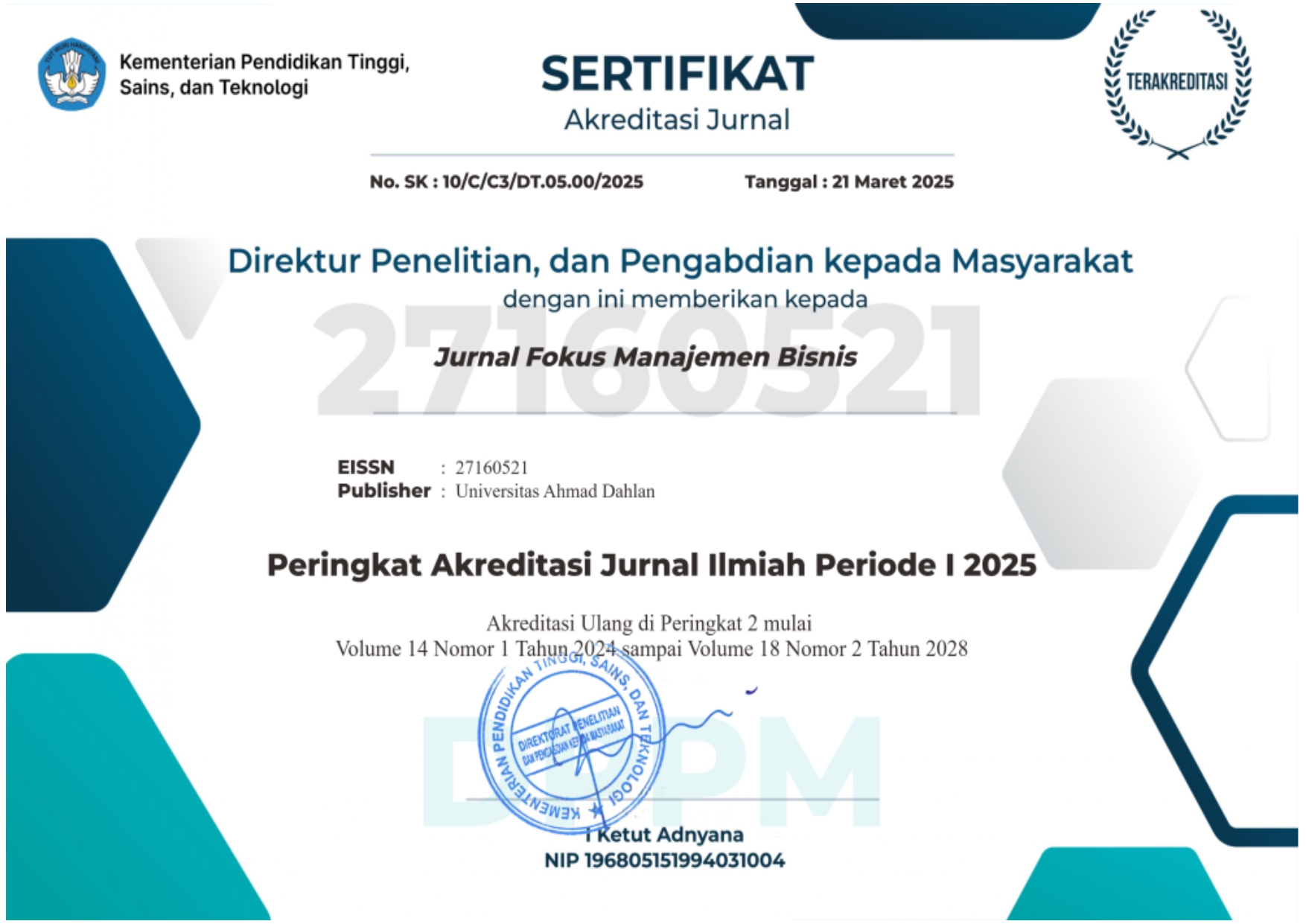EFEK LINGKUNGAN KERJA DAN EFIKASI DIRI PADA KINERJA KARYAWAN
DOI:
https://doi.org/10.12928/fokus.v11i2.4584Keywords:
Work Environment, Self-Efficacy, Employee PerformanceAbstract
This study aims to examine the effect of work environment and self-efficacy on employee performance. The object of this research is a historical and tourism site in the Semarang City, namely the Sam Poo Kong Temple and Lawang Sewu. The research was conducted in quantitative method by distributing questionnaire to the employee in the both locations. The sampling method that purposive sampling technique with the criteria of respondents are employee has been working for at least one year. Based on the data collection, a sample of 107 employees was obtained to be analyzed. The data were analyzed using regression analysis method. The results of the study strengthen the findings of previous studies that work environment and self-efficacy have a positive effect on employee performance.
References
Ali, M. S. Y., & Hasaballah, A. H. A. (2020). Assessing The Effect of Organizational Cultural Values and Employees Engagement on Performance Excellence. International Journal of Management, 11(4).
Anitha, J. (2014). Determinants of Employee Engagement and Their Impact on Employee Performance. International Journal of Productivity and Performance Management, 63(3), 308–323.
Bandura, A. (2012). On The Functional Properties of Perceived Self-Efficacy Revisited. Journal of Management, 38(1), 9–44.
Carter, W. R., Nesbit, P. L., Badham, R. J., Parker, S. K., & Sung, L. K. (2018). The Effects of Employee Engagement and Self-Efficacy on Job Performance: A Longitudinal Field Study. International Journal of Human Resource Management, 29(17), 2483–2502.
Chandrasekar, K. (2011). Workplace Environment and Its Impact on Organisational Performance in Public Sector Organisations. International Journal of Enterprise Computing and Business Systems, 1(1), 1–19.
Cherian, J., & Jacob, J. (2013). Impact of Self Efficacy on Motivation and Performance of Employees. International Journal of Business and Management, 8(14), 80–88.
Danish, R. Q., Ramzan, S., & Ahmad, F. (2013). Effect of Perceived Organizational Support and Work Environment on Organizational Commitment; Mediating Role of Self-Monitoring. Advances in Economics and Business, 1(4), 312–317.
Dul, J., & Ceylan, C. (2014). The Impact of A Creativity-Supporting Work Environment on A Firm’s Product Innovation Performance. Journal of Product Innovation Management, 31(6), 1254–1267.
Frayne, C. A., & Geringer, J. M. (2000). Self-Management Training for Improving Job Performance: A field Experiment Involving Salespeople. Journal of Applied Psychology, 85(3), 361–372.
Hair, J. F. J., Black, W. C., Babin, B. J., & Anderson, R. E. (2009). Multivariate Data Analysis. 7th Edition. Pearson.
Iroegbu, M. N. (2015). Self Efficacy and Work Performance: A Theoretical Framework of Albert Bandura's Model: Review of Findings, Implications and Directions for Future Research. Psychology and Behavioral Sciences, 4(4), 170.
Kacmar, K. M., Collins, B. J., Harris, K. J., & Judge, T. A. (2009). Core Self-Evaluations and Job Performance: The Role of the Perceived Work Environment. Journal of Applied Psychology, 94(6), 1572.
Kempiak, J., Hollywood, L., Bolan, P., & Mcmahon-Beattie, U. (2017). The Heritage Tourist: An Understanding of The Visitor Experience at Heritage Attractions. International Journal of Heritage Studies, 23(4), 375-392.
Lamb, S., & Kwok, K. C. (2016). A Longitudinal Investigation of Work Environment Stressors on The Performance and Wellbeing of Office Workers. Applied Ergonomics, 52, 104–111.
Morin, L., & Latham, G. P. P. (2000). The Effect of Mental Practice and Goal Setting as A Transfer of Training Intervention on Supervisors Self-Efficacy and Communication Skills: An Exploratory Study. Applied Psychology, 49(3), 566–578.
Poria, Y., Butler, R., & Airey, D. (2004). Links between Tourists , Heritage , and Reasons for Visiting Heritage Sites. Journal of Travel Research, 43(1), 19-28.
Ram, P., & Prabhakar, G. V. (2011). The Role of Employee Engagement in Work-Related Outcomes. Interdisciplinary Journal of Research in Business, 1(3), 47-61.
Redifer, J. L., Bae, C. L., & Zhao, Q. (2021). Self-Efficacy and Performance Feedback: Impacts on Cognitive Load during Creative Thinking. Learning and Instruction, 71, 101395.
Robbins, S. P., & Judge, T. (2015). Perilaku Organisasi. Salemba Empat.
Schmidt, A. M., & DeShon, R. P. (2010). The Moderating Effects of Performance Ambiguity on the Relationship Between Self-Efficacy and Performance. Journal of Applied Psychology, 95(3), 572.
Schultz, D. P., & Schultz, S. E. (2016). Theories of Personality. Cengage Learning.
Sugiyono. (2012). Metode Penelitian Kuantitatif, Kualitatif, dan R&D. Alfabeta.
Supriyanto, A. S., & Ekowati, V. M. (2020). Linking Work Environment to Employee Performance: The Mediating Role of Work Discipline. BISMA (Bisnis dan Manajemen), 13(1), 14-25.
Talsma, K., Schüz, B., & Norris, K. (2019). Miscalibration of Self-Efficacy and Academic Performance: Self-Efficacy ≠ Self-Fulfilling Prophecy. Learning and Individual Differences, 69, 182–195.
Tzur, K. S., Ganzach, Y., & Pazy, A. (2016). On The Positive and Negative Effects of Self-Efficacy on Performance: Reward as A Moderator. Human Performance, 29(5), 362–377.
Westerman, J. W., & Simmons, B. L. (2007). The Effects of Work Environment on The Personality-Performance Relationship: An Exploratory Study. Journal of Managerial Issues, 288-305.
Downloads
Published
How to Cite
Issue
Section
License
Authors who publish with this journal agree to the following terms:Â
- Authors retain copyright and grant the journal right of first publication with the work simultaneously licensed under a Creative Commons Attribution License that allows others to share the work with an acknowledgment of the work's authorship and initial publication in this journal.
- Authors are able to enter into separate, additional contractual arrangements for the non-exclusive distribution of the journal's published version of the work (e.g., post it to an institutional repository or publish it in a book), with an acknowledgment of its initial publication in this journal.
- Authors are permitted and encouraged to post their work online (e.g., in institutional repositories or on their website) prior to and during the submission process, as it can lead to productive exchanges, as well as earlier and greater citation of published work (See The Effect of Open Access).






